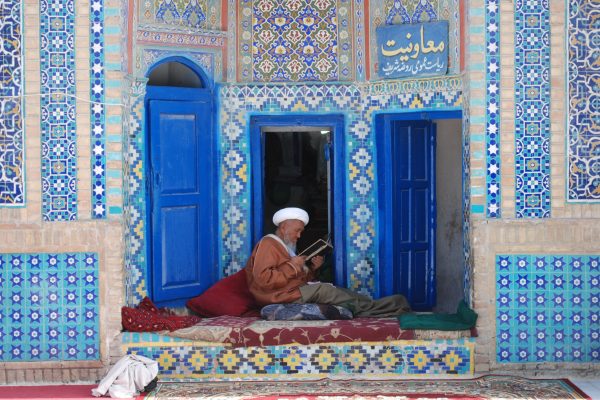Prophet Muhammad’s treatment of non-Muslims as head of state needs to be studied by today’s Muslim leaders.
Prophet Muhammad’s treatment of non-Muslims as head of state needs to be studied by today’s Muslim leaders.
When I first thought of making an attempt at covering the topic of Prophet Muhammad’s attitude towards people of faiths other than Islam, I had intended to use ‘tolerate’ rather than ‘respect’ in the title.
I changed my mind because tolerate has negative connotations, because when you tolerate something, it is a sort of reluctant acceptance – as if there is no other choice. After studying this topic, I came to know the Prophet’s behaviour towards non-Muslims was far from mere toleration. He showed respect and honour that people today could take a lesson or two from.
This area of the Prophet’s life needs to be brought to light due to the modern divergence in Islamic political governance. Today, not only does the term ‘Islamic State’ come with damaging stereotypes, but with the advent of Daesh, there is a misconception amongst most people that Muslims are very intolerant towards people who believe in something different.
It is unanimous between Muslims and non-Muslims alike that Prophet Muhammad is the personality that brought and taught Islam to the world. Based on the premise that he is the leader of Islam, it is his actions and deeds towards non-Muslims that can be used to judge what teachings Islam adopts in this matter. Therefore, if a Muslim or a group of Muslims act contrary to his teachings and practices, we can say that these actions have no Islamic basis and are based on another ideology.
This is illustrated by a selection of verses from the Holy Qur’an that talk about interfaith relationships. One verse says:
Verily! Those who believe and those who are Jews and Christians, and Sabians, whoever believes in God and the Last Day and does righteous deeds shall have their rewards with their Lord, on them shall be no fear, nor shall they grieve.”
(2:62)
Similarly, below is a narration attributed to the Prophet vis-à-vis interfaith relations:
“Whoever oppresses a Jew or a Christian, I will testify against them on the Day of Judgement” (Bukhari).
Now that readers have a general idea, I would like to go into a slightly more detailed discussion. I want to focus on Prophet Muhammad and non-Muslims using examples from how he treated the Christian communities of his time. The Prophet established an Islamic government in the holy city of Medina and as Head of State, had the responsibility of looking after the non-Muslims who lived in Islamic territory.
To enable a peaceful co-existence, the Prophet had authored and signed many treaties. Six of these were with Christians. Having read them, I’ve identified the following themes.
God-Centricity
I did not find any treaty that positioned Prophet Muhammad in a state of authority. The purpose of each treaty was to enjoin what God had instructed to the Prophet and was not from his own volition. This is epitomised when the treaties talk about people who may break the terms as having disobeyed God and incurred His displeasure. It does not mention anything in the way of retribution from the Prophet or of “breaking the Prophet’s rules” so to speak. There is not an ounce of ego, as you will read further down; none of the conditions were favourable to the Muslims and instead gave the Christians limited responsibilities and a comfortable life in the Islamic state.
For the Prophet, this was about establishing the rule and principles of the One God that the entire community believed in.
Christians Free to Practice
The Prophet stipulated that Bishops and Monks were to retain their positions without any hindrance from anyone. It was also made forbidden to destroy their churches or pressure them into selling their land in place of building mosques. Not only this, Muslims were required to help Christians build/repair churches, and should they ask for help, without taking any payment.
The Prophet was not a dogmatic individual. His objective was not to spread Islam by the sword or at any cost. It can be argued that his overarching mission was to establish a God conscious community, which is why he showed so much respect to the Christian faith. He believed Muslims and Christians had much more commonality than differences with respect to their religious doctrines and saw potential in them working together to establish a nation that lives in harmony, ultimately acting on God’s instructions Who in the Holy Qur’an says:
O mankind, indeed We have created you from male and female and made you peoples and tribes that you may know one another. Indeed, the most noble of you in the sight of Allah is the most righteous of you. Indeed, Allah is Knowing and Acquainted.”
[49:13]
Immunity From War
The Prophet and his followers had to participate in numerous defensive wars from groups who were vehemently against Islam and intent on inflicting aggression against Muslims. In these situations, the Muslims had no choice but to take up arms to defend themselves, their land, and their guests – the Christians, amongst other communities.
In a state of war, Muhammad did not place any responsibility on the Christians. Not only were the Christians exempt from participating in war, they even had no duty to contribute to the war by supplying weapons or arms, unless they volunteered. It goes without saying that the Muslims were charged with protecting their brethren in monotheism with the same vigour as they would have defended themselves.
The Prophet, being hospitable towards his guests, did not want them to fall into any hardship and therefore pledged to protect them under all circumstances.
No Force Whatsoever
Islamic law permits a Muslim man to marry a Christian woman. He, however, cannot force her to marry and must obtain the necessary consent. Furthermore, during marriage he cannot make her convert to Islam and by all means must respect her religious observances.
No Muslim could compel any Christian to convert. With this law, Holy Prophet was putting the following verse from the Holy Qur’an into practice:
“There is no compulsion in religion” (2:256).
Once again, the Prophet’s approach was about cohesion not conflict.
Justice and Mercy for all
If a Christian commits a crime, he/she is not to be dealt with unfairly. A Muslim is required to assist them by accompanying them to court and making sure that any penalty faced is in line with Islamic law and that they go through the system like anybody would. However, the emphasis was in pardoning the perpetrator and encouraging the victim to forgive and forget.
These were the views of the Prophet towards people of another faith. Remember our original premise is the undisputed view that the Prophet is the leader of Islam, and, therefore, whatever he does equals what Islam advocates.
Now, I would like to ask the reader to compare this with the so-called ‘Islamic’ groups and governments around the world and ask themselves whether they are representing the Prophet’s view of interfaith or nonfaith relations.
We have seen Daesh destroy churches and monasteries in Mosul, Iraq. In Saudi Arabia, it is against the law to practice the religion of the Catholic Church. This is not Islamic. The Islamic faith is not about dogmatism and alienating other people and societies. Rather, it is about connecting with all members of humanity on our common denominator. With faith groups, this is the belief in God and with non-faith groups, this is the belief in the principles of humanity and good morals and behaviour.
Giving too much undue importance to semantics, we have forgotten that we are not only one Ummah of Muslims but are also an Ummah of monotheists along with other Abrahamic faiths, and one Ummah in a shared humanity with everyone else. So let’s be united on our shared beliefs and values.





